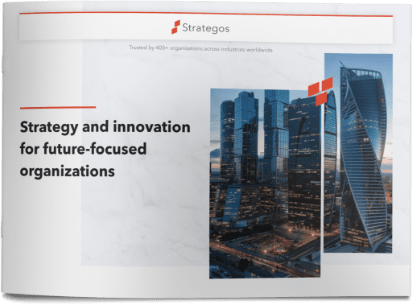How ZF improved their Innovation System
How does ZF Commercial Vehicles use Innovation to build the next generation of commercial vehicles and enable the future of automotive? In our interview with Gandert van Raemdonck, Head of Innovation, he explains how they tackled this challenge and prepared ZF for future growth.
About ZF Commercial Vehicles
ZF’s Commercial Vehicles Division aims to facilitate clean and safe mobility and transportation globally, focusing on commercial vehicles like trucks and buses. Their innovation efforts revolve around several key drivers, including autonomous driving, connectivity, electrification, and sustainability. Challenges such as strict regulations, customer demands for recyclable materials, and carbon footprint reduction shape their innovation agenda.
ZF’s Challenges with Innovation
ZF faced significant challenges when Gandert van Raemdonck took over as Head of Innovation. These included insufficient involvement from business leaders in innovation projects, a flawed decision-making process, and a lack of project overview, hindering transformative ideas. Additionally, the unique demands of commercial vehicles, such as cost efficiency and compliance with regulations, added complexity to their innovation initiatives.
Redesigning the Innovation System
To address these challenges, ZF implemented a new governance model with an Innovation Board overseeing project initiation and progress. They established project steering groups for focused outcomes and empowered teams to make decisions. An updated innovation funnel with flexibility in project execution and portfolio management provided better insights for decision-making. These measures aimed to improve collaboration, streamline decision-making, and ensure alignment with business goals.
Improve Innovation Effectiveness
The changes improved decision quality and speed, enhanced business team involvement, and better accountability. With more transparent project oversight and data-driven decision-making, ZF saw a shift towards more adjacent and transformative projects in their innovation portfolio. Regular Innovation Board meetings facilitated discussions and alignment on strategic priorities. ZF’s innovation efforts became more focused, transparent, and effective, driving tangible business impact.
Next steps
Looking ahead, ZF aims to deepen customer engagement by involving end-users in the innovation process from the outset. They prioritize market-driven innovation to address real pain points and capitalize on significant opportunities. With a focus on performance-driven outcomes and a clear mandate to deliver transformative solutions, ZF anticipates continued technological advancements in areas like driver assistance, connectivity, and zero-emission vehicles. They also envision a shift towards offering digital services alongside hardware solutions, reflecting evolving business models in the transportation sector. Overall, ZF remains committed to maintaining its technology leadership and driving innovation that delivers value to its customers and the industry.






